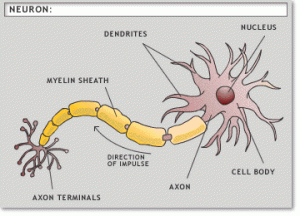Passing memories appear to be held for short term within individual nerve cells (neurons), according to a recent study. Contrary to popular scientific thinking that memories are created by brain cells getting together and forming connections.
“It’s more like RAM [random access memory] on a computer than memory stored on a disk,” said Don Cooper, assistant professor of psychiatry at the University of Texas Southwestern Medical Center. “The memory on the disk is more permanent and you can go back and access the same information repeatedly. RAM memory is rewritable temporary storage that allows multitasking.”
 Research has found that permanent memories are stored when nerve cells in the brain reorganize and strengthen the connections with one another. “But this process takes minutes to hours to turn on and off and is too slow to buffer, or temporarily hold, rapidly incoming information,” according to a statement from the university.
Research has found that permanent memories are stored when nerve cells in the brain reorganize and strengthen the connections with one another. “But this process takes minutes to hours to turn on and off and is too slow to buffer, or temporarily hold, rapidly incoming information,” according to a statement from the university.
The discovery, presented in the journal Nature Neuroscience, may also lead to improved understanding of stress-related memory loss, attention disorders and addictions.
The new study found rapid-fire inputs that last for less than a second long initiate a cellular memory process in single cells lasting as long as minute. The process is called metabotropic glutamate transmission. Researchers were able to identify specific metabotropic glutamate receptor, called mGluR5, in mice that when turned on starts a ‘signaling cascade’ using calcium to hold a memory trace. This rapid process happens inside individual cells for a very short time. In the case of long-term memory, a slow reorganization using protein occurs between cells in a network to form a permanent memory .
Researchers used nanoscale electrodes to examine the brain cells of mice in order to measure the memory formation process. Mice brains are believed to function similar to human brains, so the results could lead scientists to a better understand of how our brains store rapidly changing information.
According to Cooper, the process is similar to a gambler counting cards in a game of Black Jack. Casinos know that memory is disrupted by the insertion of alcohol and noisy backgrounds, which may account for the free drinks offered. These short-term, one-cell memories are the most sensitive to disruptions.
Next, Cooper and his team hope to develop genetic tools and drugs to expand and manipulate memory capacity in order to help those who are prone to addictions to make more intelligent choices.
“If we can identify and manipulate the molecular components of memory, we can develop drugs that boost the ability to maintain this memory trace to hopefully allow a person to complete tasks without being distracted,” Cooper said. “For the person addicted to drugs, we could strengthen this part of the brain involved with decision-making, allowing them to ignore impulses and weigh negative consequences of their behavior before they abuse drugs.”
From the desk of Ron White
Sources:
Live Science – Single Brain Cell Can Hold Memory: http://www.livescience.com/7653-single-brain-cell-hold-memory.html


